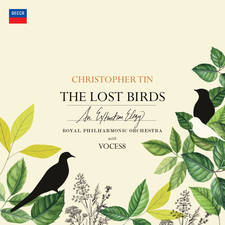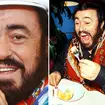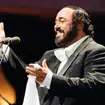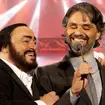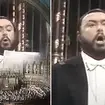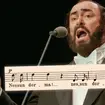Pavarotti We Salute You
To commemorate a year since the death of tenor Luciano Pavarotti, a host of top artists came together in the city of Petra in 2008 to perform a concert in honour of their much-missed colleague and friend
September 6, 2007
We’re winding along a mountain road as the evening sun descends gently in the west, throwing long shadows into the valley below. Every hundred yards, a Jordanian soldier with an automatic rifle stands guard by the roadside.
A few hairpin turns later, our driver steers down a bumpy track between sheer cliffs and pulls up before a detachment of paratroopers guarding a set of gates. We’ve reached the Ammareen Bedouin camp in Jordan, where performers and guests are gathering for the Salute Petra concert, celebrating the life of Luciano Pavarotti.
It was October 12, 2008, which would have been Pavarotti’s 73rd birthday. To mark the occasion, just weeks after the first anniversary of his death on September 6, his widow Nicoletta Mantovani decided that a memorial concert was obligatory, but she wanted to elevate the occasion into something unique and unprecedented.
She devised a plan for a weekend based in and around the ancient city of Petra (declared one of the new Seven Wonders of the World), a venue at which Pavarotti had longed to sing but had never managed to.
“If you organised a concert in, say, New York, everyone would come and then go home and that’s it, but these three days in such a magical country made it a really special experience,” said Nicoletta. “It was three days of feeling that Luciano was really here with us.”
The night before the concert, a memorial ceremony was held at the Treasury, Petra’s most photographed landmark.
In front of its floodlit columns and colonnades, flanked by portraits of Pavarotti, friends and colleagues reminisced about the departed tenor. Jordan’s Princess Haya, whose royal influence made access to the 2000-year-old site possible, used to be a showjumper, and she recalled getting to know Pavarotti when she’d competed at his annual Modena horse-shows.
Flautist Andrea Griminelli remembered how he’d been whisked from his Parisian garrett as a 20-year-old music student to join Pavarotti’s touring life of luxury hotels, private jets and screaming crowds.
Soprano Cynthia Lawrence, a winner of one of Pavarotti’s singing competitions, described how she’d been about to sing with Pavarotti in Donizetti’s L’Elisir d’amore in Philadelphia. Hours before curtain-up the theatre was suddenly condemned by safety inspectors, so Pavarotti browbeat the religious authorities into lending him the Catholic cathedral for the night.
And Sting reminisced about the night he had dinner with Pavarotti at London’s Hyde Park hotel, when the tenor arrived from a performance of Tosca at Covent Garden in full costume and received a standing ovation from fellow diners.
Mountains had to be moved before the tribute concert could take place. In the absence of a handy O2 arena or La Scala, promoter Harvey Goldsmith supervised the creation from scratch of an open-air auditorium in barren country several miles outside Petra.
Goldsmith had worked with Pavarotti since 1985 and understood the singer’s mysterious ability to persuade his surroundings to adapt to his own immense presence. It was Goldsmith who put Pavarotti onstage in Hyde Park to sing to Prince Charles and Princess Diana.
“I still get people coming up to me at airports and pinching me and saying ‘I was there’, and I know they’re talking about Hyde Park," says Harvey. “Funnily enough Pavarotti was always on my case about doing a show at Petra – I told him it’s impossible. He said, “For you, nothing is impossible!”
Goldsmith has promoted The Who, Led Zeppelin and Live8, but never anything like this. “Starting with a desert with nothing there at all, then building a stage and the sound system and bringing in lights and TV trucks and Lord knows what, that’s complicated,” he points out. “And a big issue was that a lot of artists were working over that weekend, so we had to get them in from wherever they were and then on to their next engagement.”
Thus, Plácido Domingo had to be freighted in from a date in Bombay the previous night, while his Three Tenors compadre José Carreras arrived from Moscow. Andrea Bocelli jetted over from Spain and Angela Gheorghiu flew overnight from Vienna, where she’d been singing in Faust.
Yet half an hour before showtime, as night settled over the desert, all the artists were successfully installed backstage. Out front, the 500-strong audience milled about drinking champagne and scoffing canapes, all thrown in with the £3500 ticket price. Profits generated are being donated to the United Nations High Commissioner for Refugees (UNHCR) and the World Food Programme, and to a special needs school and a children’s project in Petra.
Domingo, who was so worried about singing straight after his dash from the subcontinent that he’d considered conducting teenage Jordanian violinist Aleem Kandour instead, retreated to his private tent to blow the cobwebs from his larynx with some ear-splitting vocal exercises.
Nonetheless, he had no doubts that he’d done the right thing. "I think Luciano will be remembered as one of the greatest ever, somebody who really was unique in many of the things he did," he said. "He had a God-given voice that made him so much loved by everybody. It had a very thrilling quality."
A few yards away, subterranean rumblings emanated from baritone Sherrill Milnes, a burly, silver-haired figure who sang frequently with Pavarotti and Domingo. As Angela Gheorghiu floated past I congratulated her on her stunning crimson frock and was rewarded with lavish air-kisses. Sting huddled together with Bocelli to duet softly to the strains of Edin Karamazov’s lute.
“I don’t think there’s much point in looking for heirs to Pavarotti,” said Bocelli, who freely admits that Luciano’s patronage was vital to his own success. “He was unique. He touched people’s hearts the world over in a special way. The rest of us just try to do our best.”
Multi-artist concerts are often less than the sum of their parts, but on this occasion the mix of performers, location and a shared desire to do the right thing by Pavarotti produced some touchingly emotional highlights. It even seemed that the absence of Pavarotti might have freed the artists to express themselves. At his Modena charity concerts, I was often struck by the terror on the faces of rock artists such as Jon Bon Jovi or Meatloaf as they prepared to sing in the shadow of the planet’s most revered opera star.
In Petra, the mood was bright and celebratory. Carreras opened the scoring with a brisk and witty "Chitarra romana", then was joined by Domingo, grey and grizzled like an old mountain lion, for "Non ti scordar di me". Italian rapper Jovanotti partnered Italian singer Laura Pausini for "Caruso", a pop song about tenors once sung by Pavarotti, while Bocelli took on one of Pavarotti’s signature arias, "E lucevan le stele" from Tosca.
The Sting-Gheorghiu duet on Mozart’s "La ci darem la mano" (from Don Giovanni) probably notched the highest score on the evening’s clapometer, Sting compensating for his non-operatic technique by hamming it up suggestively with the saucy diva.
The evening revved towards its climax with Gheorghiu, Milnes, Lawrence and Bocelli banding together for a stirring romp through the third-act quartet from La bohème. And for a finale, Pavarotti himself materalised on the video screens, singing "Nessun dorma".
It was a jolt to be reminded of the scintillating quality of the big man’s singing.
"I think Luciano had the sun in his voice," was how Carreras put it. "It was such a bright, pure sound. He was also a charismatic guy, a great personality on stage"’
Sting added that,
"He was a pop singer eventually, singing 'Nessun dorma' to football crowds. That’s popularising opera and I think he should be applauded for that."
Well he is, and probably always will be.
